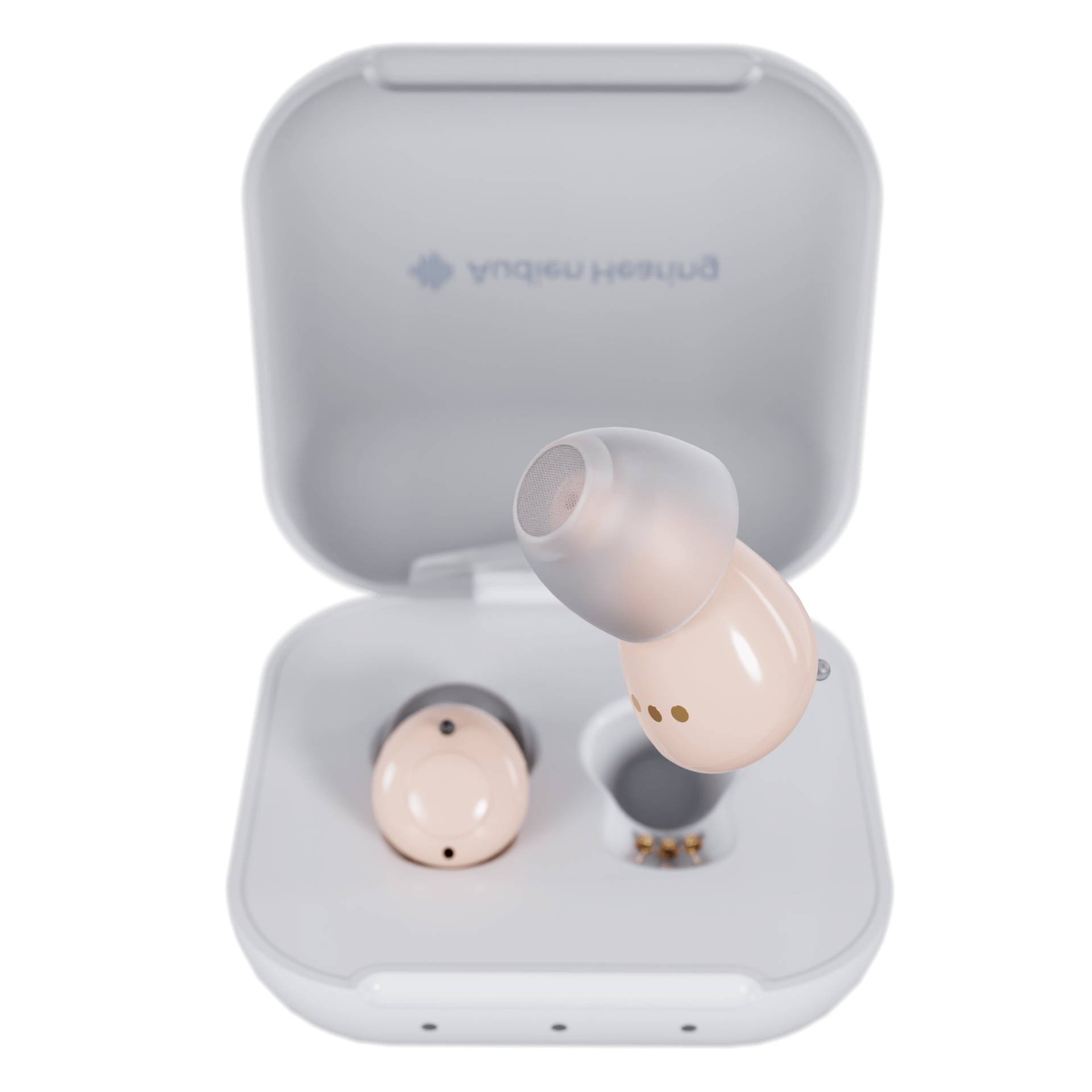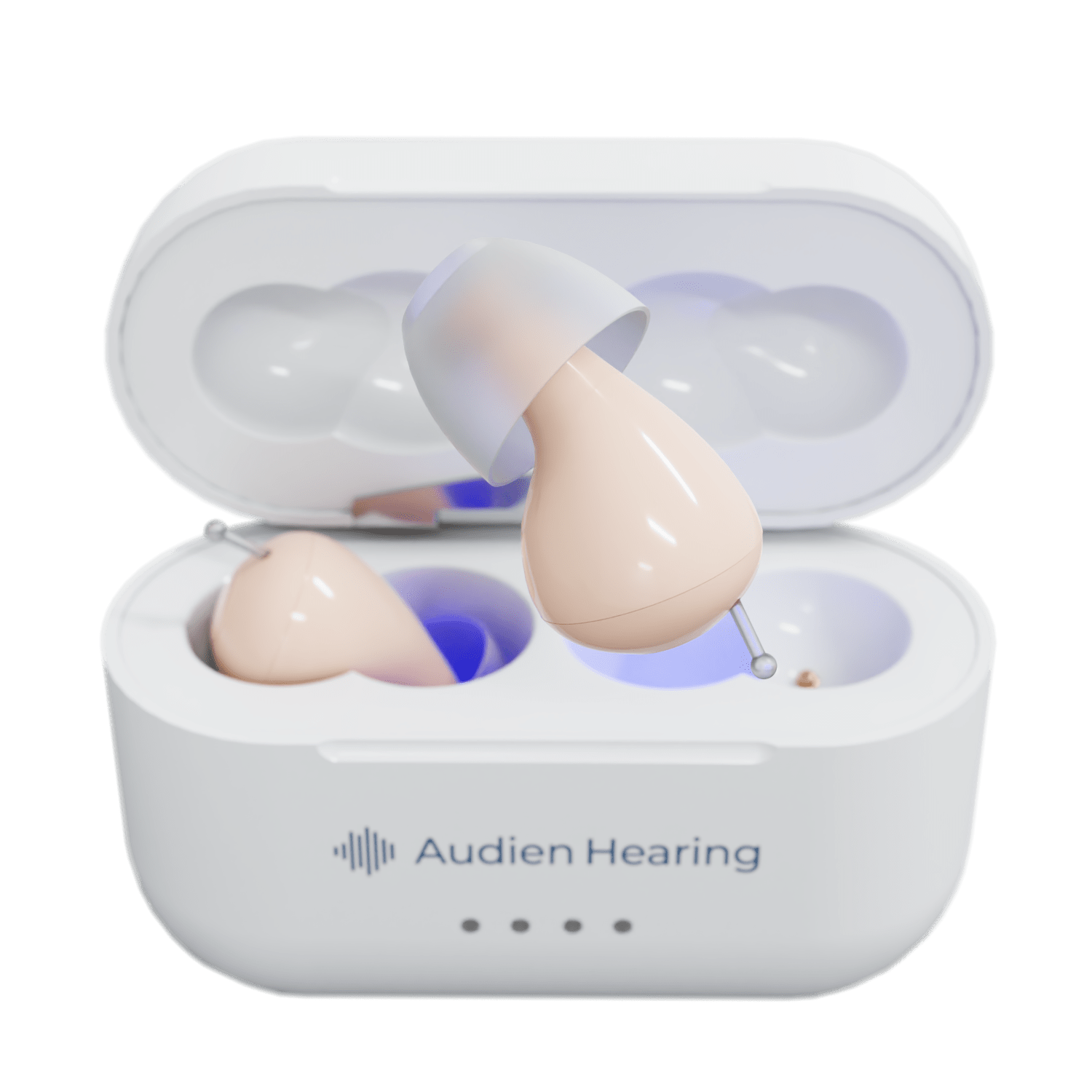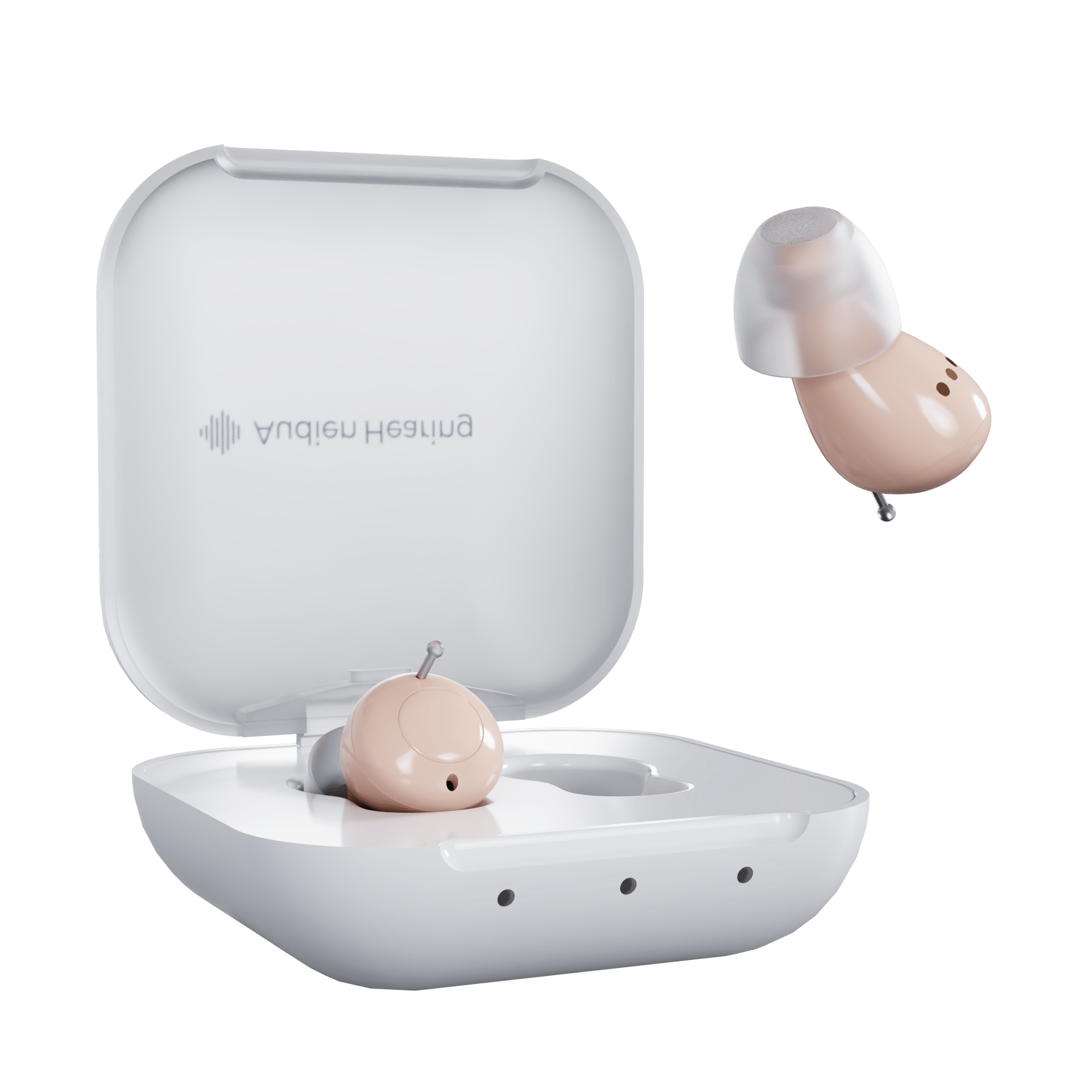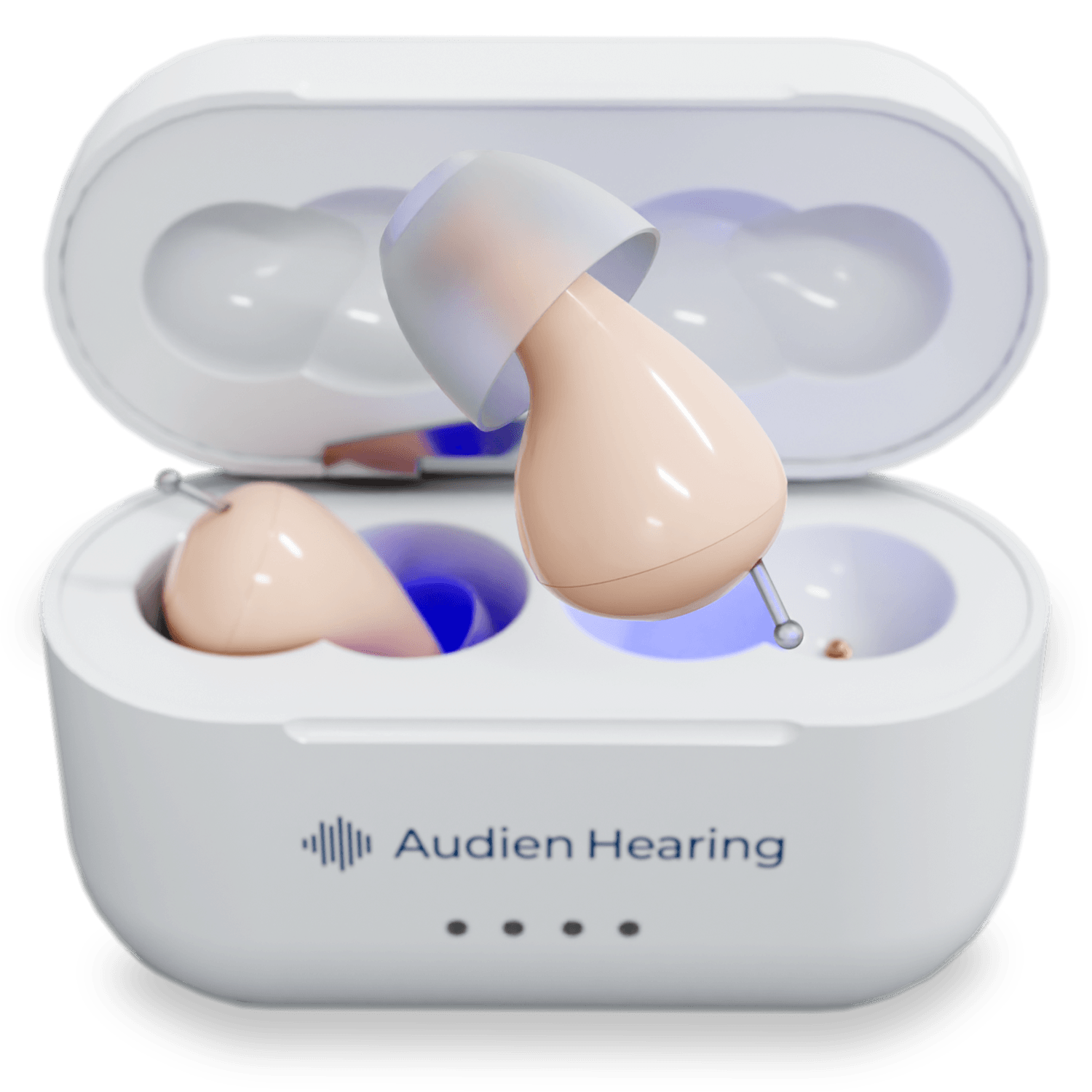Hearing loss, no matter how minor, gets in the way of living life to the fullest. From missing the joke on TV to struggling with conversations in noisy environments, you need support - and it’s more accessible than ever before, thanks to brands like Jabra.
Whether you’re exploring FDA-registered OTC hearing aids for mild-to-moderate hearing loss or seeking prescription options for more advanced hearing needs, Jabra has a device for you. But the high prices and hurdles you’ll have to deal with along the way can lead you to look for a Jabra hearing aids alternative. Your search ends here!
We’ll help you weigh your options below, from other popular prescription hearing aid manufacturers like Phonak and Signia to more affordable, straightforward solutions like our stylish hearing aids at Audien Hearing.
You can buy hearing aids online today for as little as $98 if you’re just struggling with mild to moderate hearing loss, and avoid the hassle of in-person hearing tests, fittings, and follow-ups. Just activate your device and get back to living life on your terms. Explore Audien Hearing now!
“As I have aged, I’ve noticed it was getting harder to hear tv, other people, bird songs, etc. My wife purchased my first ever hearing aids—the Audien Atom Pro 2 for me in April 2025. It has opened up a whole new, wonderful world of sound for me.” - Gena
“Over the years I have tried many brands of OTC hearing aids but the customer service of Audien Hearing consistently stands out from the competition.” - Ron
“I ordered the Audien Atom Pro 2 hearing aids for my husband and he was thrilled that they worked so well. I highly recommend their hearing aids. They are second to none and their customer service is outstanding.” - Emily
Quick Guide to Choosing a Jabra Hearing Aids Alternative
|
Brand |
Channel |
Styles |
Controls |
Streaming |
In-Person Fitting |
Typical Price (pair) |
|
Audien Hearing (OTC pick for mild–moderate) |
OTC • Direct-to-Consumer |
CIC (in-canal), BTE; nearly invisible options |
Simple case or on-device controls; no prescription; fast setup |
Available on select models |
No (self-fit); lifetime support provided |
$98–$600+ (model-dependent) |
|
Phonak |
Prescription • Audiologist |
RIC, BTE, custom; accessories ecosystem |
App + on-device; clinic programming |
Robust Bluetooth options |
Yes (evaluation, fitting, follow-ups) |
~$3,000–$7,500+ |
|
MDHearing |
OTC • Direct-to-Consumer |
BTE, RIC, CIC (varies by model) |
App (on select models) + buttons |
Select models stream calls/media |
No; remote support available |
~$300–$800+ |
|
Lexie (powered by Bose) |
OTC • Online/Retail |
RIC (self-fit) |
Mobile app + buttons |
Phone call streaming; media varies |
No; guided remote setup |
~$999–$1,199 |
|
Signia |
Prescription • Audiologist |
RIC, BTE, CIC/ITE; slim designs |
App + on-device; advanced automation |
Full streaming + accessories |
Yes (clinic fit & follow-up) |
~$3,000–$7,500+ |
|
Eargo |
OTC • Direct-to-Consumer |
CIC (virtually invisible) |
App + tap gestures |
Call/media streaming on newer models |
No; remote care included |
~$799–$2,700 |
|
Neebroo |
OTC • Online |
CIC / in-ear (budget) |
On-device buttons; simple modes |
Limited/varies by model |
No |
Low-budget tier |
|
Oticon |
Prescription • Audiologist |
RIC, BTE, custom; premium tiers |
App + on-device; clinician tuned |
Comprehensive streaming suite |
Yes (clinic fit & REM) |
~$3,000–$7,500+ |
|
Nano |
OTC • Online |
CIC, BTE (budget range) |
On-device; some app options |
Varies by model |
No |
Low-to-mid OTC pricing |
|
Bossa |
OTC • Online |
Budget in-ear models |
Basic on-device |
Limited/varies |
No |
Entry-level pricing |
Overview of Jabra Hearing Aids
As one of the many brands under the GN Group - a massive manufacturer of audio solutions - Jabra hearing aids have come to be known as a reliable choice for a variety of people.
While hearing loss is never one-size-fits-all, it’s safe to say Jabra offers one of the most extensive lineups to address most lifestyles and budgets. The two most popular models in the lineup right now are the Jabra Enhance Select and the Jabra Enhance Pro:
- Jabra Enhance Select (Starting at $1,195): These receiver-in-ear (RIE) devices are ideal for mild-to-moderate hearing loss. You get 3 technology levels, ranging from basic to advanced, with telehealth fitting and care. These OTC devices can be purchased online.
- Jabra Enhance Pro (Starting at $1,699): A prescription device sold and serviced through Costco hearing centers for more profound hearing loss. Forms range from RIE to BTE (behind-the-ear) and custom fits. Users gain access to a premium technology level.
These hearing aids are packed with features ranging from Bluetooth streaming to Soundscape, iOS hands-free calls, TapControl, weatherproofing, rechargeable batteries, and more. You can choose from a range of colors and styles to fit your preferences, too.
That said, you’re here hoping to find a better Jabra hearing aids alternative, and the truth is, you’re not alone. They may offer more complexity and cost than necessary for individuals seeking straightforward support for mild-to-moderate hearing loss.
The good news? More affordable solutions that perform just as well are just a few clicks away.
Jabra Hearing Aids Alternative
Jabra has made hearing support more approachable for people who want flexibility between app-based control and professional fitting. We can appreciate that. But you have more options at your fingertips than ever before, and your hearing loss is not something to be taken lightly.
We’ve read through countless Jabra hearing aids reviews and found that a lot of users find the process of choosing, programming, and maintaining these devices to be complex or unnecessarily expensive, especially when their hearing loss is only mild to moderate.
That’s where Audien Hearing steps in with a radically different approach.
Audien Hearing
We design FDA-registered OTC hearing aids that work right out of the box—no hearing test, professional fitting, or hidden setup fees required. Each device is pre-tuned to amplify voices and reduce background noise, making everyday listening at home, work, or in conversation easier than before.
You can buy a device tailored to your lifestyle, preferences, and budget right now. Because we recognize hearing loss is not one-size-fits-all, we offer a device for anyone struggling with mild-to-moderate hearing loss:
- Atom One is a basic entry point at less than $100 for those curious about hearing support but cautious about cost. 1 hearing mode, 24 hour battery life.
- Atom Pro 2 brings advanced noise filtering and a UV-sanitizing charging case to keep earpieces clean between uses. You get 4 hearing modes, a stronger sound chip, and 48 hour battery life.
- Ion Pro is a BTE design for users who prefer a stable fit and longer wear time. You get 6 hearing modes, Bluetooth streaming, app control, and directional sound technology.
- Atom X is our newest innovation with a touchscreen case for controlling the device - no tiny buttons, confusing app, or hassle. Powered by the award-winning A2 MAX™ sound chip.
We’ve made a dramatic difference in the lives of more than a million people, and we’re proud of the work we’re doing to make hearing support more accessible for all. That’s why we back your order with our 45-day money-back guarantee. We want you to feel confident trying our devices. You also get lifetime support.
You can learn more about Audien vs Jabra hearing aids in our blog if you’d like, as we have a more thorough side-by-side comparison breaking down the differences. Otherwise, compare our models or get a personalized recommendation from one of our experts today!
Phonak
- Starting Price: Around $3,000–$7,000+ per pair
- Device Styles: RIC, BTE, custom ITE/CIC
- OTC or Prescription: Prescription only
- Pros: Exceptional sound processing, reliable Bluetooth, strong clinical support
- Cons: High cost, requires in-person fitting, limited DIY adjustment
Phonak is one of the most established prescription brands in hearing care, with two really popular lines of hearing aids: the Luminity and Paradise series.
These devices provide adaptive speech recognition, automatic environmental adjustment, and connectivity. You can connect seamlessly with your iPhone and Android to take calls and stream music, podcasts, or anything in between.
Just know that as a prescription-focused brand, you’ll need to find a licensed audiologist in your area to gain access to Phonak devices. This adds cost and setup time. It’s worth it for people with really profound hearing loss, but those with mild-to-moderate hearing loss will find it a bit much.
MDHearing
- Starting Price: ~$299–$799 per pair
- Device Styles: BTE, RIC, CIC (depending on model)
- OTC or Prescription: OTC
- Pros: Affordable, FDA-registered, lifetime support
- Cons: Basic noise reduction, limited connectivity
MDHearing makes medical-grade hearing aids designed for older adults seeking reliable amplification without a prescription. The Volt Max and Neo devices are popular for rechargeable convenience, background noise suppression, and simple on-device volume control
The biggest downsides to these devices, though, are the lack of advanced app integration and Bluetooth streaming. You do get solid clarity for everyday use, making MDHearing a practical option for budget-conscious users who prefer phone/email support over in-person visits.
You can take a closer look at Audien vs MD Hearing in our blog if you want a better idea of how these two OTC brands stack up. But just know our devices are more affordable and packed with just as much, if not more, functionality and features.
Lexie
- Starting Price: ~$999–$1,199 per pair
- Device Styles: RIC
- OTC or Prescription: OTC
- Pros: Excellent self-fit customization, trusted Bose sound profile, app-guided setup
- Cons: Requires smartphone use, not suited for severe hearing loss
Lexie’s B1 and B2 Powered by Bose models have been referred to as the “best self-fit OTC options on the market.” They’re definitely a solid contender for a Jabra hearing aids alternative.
You get to adjust tone, volume, and balance directly through the Lexie app using Bose’s sound technology. Audio quality is strong, and the design is sleek, but full functionality depends on having a smartphone. Not everyone wants to feel tethered to their phone all day, or bother with app adjustments in the first place.
It’s also worth noting that these are pretty expensive devices by OTC standards, which is the biggest difference between Audien and Lexie. Our devices are a fraction of the cost, starting at $98, compared to $999. See how the Jabra vs Lexie hearing aid lineups stack up in our blog.
Signia
- Starting Price: ~$3,000–$7,500+ per pair
- Device Styles: RIC, BTE, ITE, slim-RIC
- OTC or Prescription: Prescription only
- Pros: Excellent speech clarity, advanced motion sensors, sleek designs
- Cons: Expensive, requires in-person fitting
Anyone looking for prescription hearing aids will be drawn towards the sophistication Signia has earned a reputation for. As a leading brand under the WS Audiology group, Signia focuses on high-performance sound processing and comfort.
The Pure Charge&Go IX and Styletto IX models use motion sensors and AI-based conversation tracking to enhance speech in dynamic environments. These devices provide strong Bluetooth performance and rechargeable convenience.
We have a more thorough comparison of Signia vs Jabra hearing aids if you want to get a better understanding of whether or not this is the right Habra hearing aid alternative for you.
Eargo
- Starting Price: ~$799–$2,750 per pair
- Device Styles: CIC (virtually invisible)
- OTC or Prescription: OTC
- Pros: Rechargeable, sleek fit, lifetime remote support
- Cons: No Bluetooth streaming, limited to mild–moderate loss
Eargo builds nearly invisible in-ear hearing aids designed for comfort and simplicity. These are popular OTC options for mild-to-moderate hearing loss, but some of the brand’s devices are priced as if they’re a prescription solution.
Models like Eargo 7 feature feedback reduction, automatic environment adjustment, and portable charging. Their open-fit design minimizes occlusion for a natural sound profile. But again, Audien Hearing brings you OTC support at a much more affordable price point.
Neebroo
- Starting Price: ~$200–$400 per pair
- Device Styles: CIC / in-ear
- OTC or Prescription: OTC
- Pros: Low-cost, rechargeable, straightforward setup
- Cons: Limited features, shorter lifespan, variable quality
Neebroo is among the most budget-friendly OTC alternatives to Jabra hearing aids on the market. Their compact in-ear devices provide simple amplification, a rechargeable case, and basic volume adjustment.
You get what you pay for compared to more expensive brands, though. Neebroo devices lack the refined processing of other alternatives on this list. And in looking at the cost-to-feature ratio, these models fall short of what’s available for you here at Audien Hearing.
Oticon
- Starting Price: ~$3,000–$7,500+ per pair
- Device Styles: RIC, BTE, ITE
- OTC or Prescription: Prescription only
- Pros: Natural sound profile, advanced brain-hearing technology, robust connectivity
- Cons: High cost, requires professional fitting
Oticon’s Real and Own series use open sound processing to maintain environmental awareness and natural listening comfort. These aids analyze multiple speakers simultaneously rather than isolating one voice, creating a realistic hearing experience.
This is a solid Jabra hearing aids alternative if you’re looking for natural sound quality and professional fitting, particularly for moderate to severe hearing loss. Learn more about Costco hearing aids vs Oticon devices in our blog.
Nano
- Starting Price: ~$300–$600 per pair
- Device Styles: BTE, CIC
- OTC or Prescription: OTC
- Pros: Affordable, rechargeable options, simple controls
- Cons: Inconsistent build quality, minimal sound customization
Nano is another popular OTC Jabra hearing aids alternative. These devices are less than a third of what you’d pay for the Jabra Select line of devices, and you still get plenty of functionality for addressing mild-to-moderate hearing loss.
These devices amplify conversation and reduce some ambient noise but lack advanced tuning or Bluetooth streaming. Still, it’s not a bad choice for an inexpensive, entry-level solution with basic functionality. Just know you’re settling for less compared to Audien Hearing.
Bossa
- Starting Price: ~$100–$300 per pair
- Device Styles: In-ear, behind-the-ear (varies)
- OTC or Prescription: OTC
- Pros: Budget-friendly, simple controls, rechargeable
- Cons: Limited clarity, not suitable for long-term daily use
Last but not least, we have Bossa - a brand known for budget-friendly amplification devices designed for users exploring their first step into hearing support. They’re easy to charge and wear, though performance tends to be basic according to the typical Bossa hearing aids review.
Bossa’s products may suit someone curious about hearing aids but not ready to commit to a premium brand or clinical model. But with a similar price point to Audien Hearing, it’s worth exploring our lineup first. Bossa has a much lower Trustpilot rating of 2.4!
Which Jabra Hearing Aids Alternative is Right For You?
There you have, all the top Jabra alternatives on the market right now. But which of these brands and devices best fits your hearing profile, lifestyle, and budget? Here are some quick tips on narrowing it down to the perfect Jabra hearing aids alternative.
Do You Need OTC or Prescription Support?
First, you should figure out the exact level of support you need. This may require a hearing test to figure out whether your hearing loss is mild, moderate, or severe. From there, you can choose between OTC solutions and prescription devices.
The vast majority of people struggling with hearing loss fall into the mild-to-moderate range - and the OTC devices we sell here at Audien Hearing could be all you need to start hearing clearly once again. You can bypass the expenses and hurdles that come with the prescription route with the best hearing aid under $100 or the best hearing aids under $200.
On the other hand, these devices wouldn’t be a good fit for you if your hearing loss is more profound. You’d need the advanced support and customization that comes with audiologist care.
Consider the Features That Matter Most
There’s a lot of overlap across the options we outlined for a Jabra hearing aids alternative. Most have Bluetooth streaming, portable charging cases, background noise reduction, etc. Compare features to get a sense of what matters most to you in a device.
For users with mild-to-moderate hearing loss in particular, advanced features like app-controlled EQ or complex programming add cost without meaningful benefit. Instead, prioritize the fundamentals: consistent sound quality, comfort during long wear, and reliable rechargeability.
Ongoing Brand Support or Audiologist Care
Your experience doesn’t end when you buy a hearing aid. It’s shaped by the kind of support that follows. Prescription brands require audiologist fittings and in-office adjustments, which can improve outcomes for complex cases but also increase cost and dependence on clinic visits.
Meanwhile, OTC brands like Audien Hearing provide lifetime support to help you make the most of your device long after you purchase it. Whether that means replacing faulty devices or helping you find a better fit within the 45-day free trial, we’re always here to help.
The Cost Side of Things
Hearing aids can vary from under $100 to over $7,000 per pair. The price you’ll pay all depends on the technology and care model. Prescription brands bundle clinical service into their pricing, which benefits those with complex hearing profiles but excludes many people due to cost.
In contrast, OTC models close that gap to deliver high-quality amplification and rechargeable batteries at a fraction of the price. Audien’s models, for instance, start at $98 and still include features like noise reduction, UV cleaning, and Bluetooth connectivity in higher tiers.
Wrapping Up Our List of Jabra Alternatives
We hope you have a better understanding of which Jabra alternatives are the best fit for your unique hearing profile, budget, and lifestyle. There are plenty of great candidates on the market. But for those seeking OTC support, the #1 Jabra hearing aids alternative is Audien Hearing.
Find your perfect balance of clarity and simplicity at Audien Hearing today. Skip the clinic and hear life clearly again with our ready-to-use devices, starting at $98!













